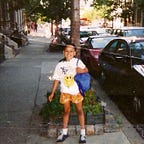Social-J Spotlight: Noa Radosh
Noa Radosh is part of the CUNY Graduate School of Journalism’s 2016 class of social journalists. Her graduate project was Forus Sifer Kilometer, a startup aimed at helping young Palestinians find employment. Recently, I spoke to Noa about her post-graduate accomplishments, the future of journalism, and her new role at Democracy Now.
You can read all about Noa and our 2016 graduates’ final projects here.
Martika Ornella: What were you doing this summer?
Noa Radosh: Over the summer, I was part of a fellowship at Brandeis University. The fellowship is called Our Generation Speaks. It’s a 26-person cohort from Palestine and Israel, taking classes on social entrepreneurship and eventually building a startup together. The startup we built is called YallaTalk. It’s a language practicing platform that pairs new language learners with native speakers for an interactive experience through a phone call. My team and I built this startup for practicing languages, starting with Arabic, in order to give Palestinians a source of income — A supplemental income while they’re looking for jobs, because Palestinians in the West Bank have a hard time finding jobs. Almost all of them are very educated, fresh out of college, but they don’t have opportunities.
We want bring new opportunities to them [YallaTalk users]. Not only sources of income, but a way to build bridges among them and outside communities. — Noa
M: Will you be continuing with this project, or extending it in a way that connects it to your practicum?
N: I’m continuing with YallaTalk and my partners and I are now developing an app. We’ve received funding from the Our Generation Speaks fellowship, which is a nonprofit supported by various donors. My partners are in Palestine, and I’m here, so I’m the connection to the states, and they’re connecting with native speakers and service providers. Eventually what we also want to do is tell the stories of these people, which is very in accordance with what we do in social journalism.
Listening to their stories, it allows you to develop more empathy, which better helps tell the objective and aim of a project. — Noa
M: What do you do at Democracy Now?
N: I’m on the Spanish team. What we do is translate the content as it comes through in English. Everyday, there’s a daily show from Amy Goodman, with headlines, breaking news, and national and international news. What we do is post the news in Spanish on social media, in order to grow our Spanish-speaking social following. What I do is transcribe, but I’m also given a lot of space to come up with stories and pitch them to Democracy Now.
M: How important do you think Spanish-language news is in New York City?
N: Vital. As a Spanish speaker, I didn’t realize how important it is until I started becoming more a part of the Spanish community here in New York. We are, the Spanish speaking population, the largest minority in this country. In New York, everywhere I go, I speak Spanish. It’s not just about the language, it’s about the culture. It’s very important to know how to create content for people.
In social-j, we ask, “Who’s your audience?” — Noa
M: In this really tense social and political climate, how do you think we, as journalists, can build trust between us and the public we serve?
N: In everything, not just in journalism, but I also see it with reaching peace in the Middle East, it’s about getting to know the people that you are interviewing — But not know, as in just one-on-one, but really getting to know a people. Reading about things, asking people, being curious. Getting to know the other side, really knowing the other side.
Right now, there’s a bit of a crisis in journalism, but journalism is made by people. As long as the relationships among people have a strong base, I believe that journalism can get to a better place. — Noa
M: What advice do you have for future social journalists?
N: Don’t stop. What we learned last year, and what I’ve learned this year, is that social journalism is very necessary. That’s sort of obvious now. We need social-j, but it’s not so obvious to everyone.
We need to always speak to its principles and what social journalism means. The ways you can use it to improve and better serve communities. — Noa
This interview is part of a new profile series highlighting alumni and current students of the CUNY School of Journalism’s social journalism program. Follow #socialj for more stories of innovation, community-centered journalism, and updates from our graduates.
